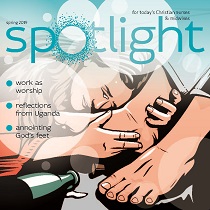At the Student Conference in February this year, John Wyatt took us through a three-part series on the theme: Work, Rest and Pray: Living life in God's perfect motion. Here are some reflections on his main points on living life as a Christian health professional and how to choose to become the person that Christ has called us to be, rather than turning our backs on our calling.
living sacrificial lives: the early church and the devastating reality of the plague
During the great Cyprian plague of the 3rd century, 15% of the population of Alexandria perished. At the onset of the disease, pagans pushed sufferers away, throwing even those who weren't yet dead into the streets and effectively shunning their family members to avoid catching the highly contagious disease. But then Christians stepped in. They showed unbounding love and loyalty to their neighbours, took charge of the sick; attended to their every need, and served them through the love of Christ, even at the expense of their own lives.
This led to the formation of some of the first hospitals, which were named after the Latin word hospes, which means guest or host. Hospitals became known as places where Christian hospitality could be practised to those who knew nothing of Christ. In those times, being a nurse (a Christian who cared for the sick) became a position of honour and respect.
Nursing remains a highly respected profession today, but it still comes at great cost. Like the early church who nursed the sick whilst risking their lives, we too are called to live sacrificial lives for Christ. Are we prepared to do this? And to do this with joy - just like the Christians did during the plague?
being Christ to our patients
A well-known verse in Ephesians states that 'we are God's handiwork, created in Christ Jesus to do good works, which God prepared in advance for us to do' (Ephesians 2:10). We are God's masterpieces, and it is his powerful and creative work that has made us. If God has called us, as Christians, to bear his image and to carry out his works in today's world, this means that we dare not treat others with disrespect or as inferior beings. Also, out of gratitude for God's amazing gift of salvation, it is his intention that this salvation will result in acts of service, serving others with kindness, love, gentleness and respect (some of the fruits of the Spirit). This has big implications for us as nurses, where much of our working lives are spent serving others who are helpless and in need.
This personally challenges me deeply. Although as nurses we are so tightly restricted in what we can say about the gospel at work, God has clearly called us to show his love to those whom we nurse in practical ways, bearing the image of Christ to our patients. Although the work can be hard under the pressures and strains of the healthcare system, it is so important that we consider how we can live a working life which is different to those around us, by showing Christ's character to our patients and colleagues.
work, rest and pray; the importance of rest
As well as calling us to work and serve those around us, God also calls us to rest, which is part of the order that he has placed in creation. We work in an action-oriented job. Nursing responsibilities can often overflow into our free time, and it can often seem like there is always something to do with no time to rest. However, God sets a pattern of work and Sabbath rest, which began in creation. 'On the seventh day he rested from all his work. Then God blessed the seventh day and made it holy' (Genesis 2:2-3). If he rested from his work, then we shouldn't be surprised that we are also called to rest. God designed us to be creatures of routine, setting us daily, weekly, and yearly rhythms as part of his creation, with rest factored into each of these rhythms.
Although shift work as a nurse can seem completely unconducive to maintaining routines, including rest time, it is vitally important that we develop good habits even in the smallest aspects of our lives. For example, on days off could you set a rhythm of waking up at a set time, doing a certain activity (even committing to going to the gym) and closing the day with time with God? On shift days, where it can seem impossible to set any sort of external routine, could you commit to listening to a Christian podcast on your way into work? These suggestions are unlikely to work for everyone, but I would love to encourage you to think about setting your own routines even on the smallest level.
Although Christ sets these rhythms as part of creation, fortunately (as part of his loving and gracious character) he also recognises that it may not always be possible to get enough rest in a physical sense, during certain seasons of our lives. Exodus 33:14 states 'My Presence will go with you, and I will give you rest.' What an amazing comfort to know that even when we feel so physically weak and tired, we can reach out to God and he will give us the rest that we so badly need.
Kara Jackman is a student nurse in Southampton































